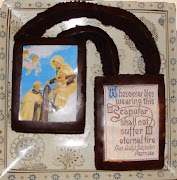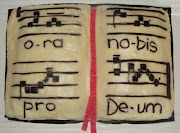The children and I travelled to Marian Valley for the feast of the Immaculate Conception. Thanksgiving...was continually echoing thorough my soul. Thanksgiving for so many things, through the powerful intercession of Our Lady under this most beautiful title.
This year we sewed miraculous medals inside the scapulars of each member of our family, in order to make sure everyone is wearing one without the worry of the medal falling off.
We have had for a few years now, our Miraculous Medal prayer petition mobile, where we pin the intentions we pray for daily and the prayer we recite is: "Oh Mary, conceived without sin, pray for us who have recourse to thee."
 Here is 'dear boy' who turned 4 the day before - 7th of December. Dear Boy was born at 9pm at night, on the eve of the Immaculate Conception, in that year it was the 150th anniversary of the proclaimation of the dogma of the Immaculate Conception.
Here is 'dear boy' who turned 4 the day before - 7th of December. Dear Boy was born at 9pm at night, on the eve of the Immaculate Conception, in that year it was the 150th anniversary of the proclaimation of the dogma of the Immaculate Conception.
Our oldest child, ds 14 is also celebrating his baptismal day, today.
 We were particularly thankful for the prayers answered for dh's new job. He put in his application at a nursing home directly opposite our home on the feast of the Miraculous Medal (27th of Nov) and he was interviewed the next day and given work immediately on the feast of St Catherine Labore (28th of Nov)
We were particularly thankful for the prayers answered for dh's new job. He put in his application at a nursing home directly opposite our home on the feast of the Miraculous Medal (27th of Nov) and he was interviewed the next day and given work immediately on the feast of St Catherine Labore (28th of Nov) We have always entrusted dh's work under the patronage of St Joseph, so we visited his shrine at Marian Valley as well.
 Here is the beautiful shrine of Our Lady of Lourdes...when asked by St Bernadette who she was, Our Lady finally replied, "I am The Immaculate Conception" Father talked beautifully on these words today during the homily at the Mass in Our Lady's honour.
Here is the beautiful shrine of Our Lady of Lourdes...when asked by St Bernadette who she was, Our Lady finally replied, "I am The Immaculate Conception" Father talked beautifully on these words today during the homily at the Mass in Our Lady's honour. Look at that beautiful little ladybug at the bottom of the flowers!
Look at that beautiful little ladybug at the bottom of the flowers! Marian Valley is full of these Agapanthus "Lily of the Nile" - they're blue or white heads are so Marian!
Marian Valley is full of these Agapanthus "Lily of the Nile" - they're blue or white heads are so Marian! This beautiful shirne is still being built but I am sure it will be dedicated under the title of today's feast.
This beautiful shirne is still being built but I am sure it will be dedicated under the title of today's feast. Oldest and youngest daughters...enjoying the natural beauty of this Valley.
Oldest and youngest daughters...enjoying the natural beauty of this Valley. Today I am particularly thankful for this blessing, born in January this year - named in honour of the Annunciation, where the Angel Gabriel announced that Our Lady was "Full of Grace" - this biblical greeting is very unique and is one of the biblical references to Our Lady's Immaculate Conception:
Today I am particularly thankful for this blessing, born in January this year - named in honour of the Annunciation, where the Angel Gabriel announced that Our Lady was "Full of Grace" - this biblical greeting is very unique and is one of the biblical references to Our Lady's Immaculate Conception: "The English translation, "Hail, Full of Grace," is based on the Greek of Gospel of Luke 1:28, "Χαίρε, Κεχαριτωμένη", Chaire kecharitomene, a phrase which can most literally be translated: "Rejoice, you who have been graced." The latter word, kecharitomene, is the passive voice, present perfect participle of the verb "to grace" in the feminine gender, vocative case; therefore the Greek syntax indicates that the action of the verb has been fully completed in the past, with results continuing into the future. Put another way, it means that the subject (Mary) was graced fully and completely at some time in the past, and continued in that fully graced state."







































































































No comments:
Post a Comment